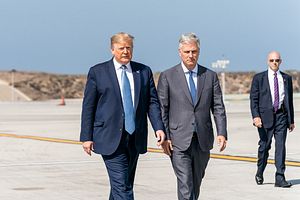The Trump administration has continued to seek contact with North Korea in an effort to reinstate working-level talks to discuss the country’s nuclear weapons program, a senior U.S. official has said.
Robert C. O’Brien, the assistant to the U.S. president on national security affairs (APNSA), told Axios in an interview that the United States has been actively making efforts to return to working-level talks with North Korea.
The administration has “reached out to the North Koreans,” O’Brien said. “We’ve been letting them know, through various channels, that we would like to get those [negotiations] back on track and to implement Chairman Kim’s commitment” to denuclearization of the Korean Peninsula,” he added.
Working-level talks between the two sides have not resumed since an attempt in October 2019 when U.S. Special Representative for North Korea Stephen E. Biegun met Kim Myong Gil, North Korea’s appointed negotiator, in Stockholm, Sweden.
O’Brien expressed some optimism about the fact that despite a widely anticipated significant missile test — or other demonstration — at the end of 2019, North Korean leader Kim Jong Un has not yet moved ahead with any testing.
Kim “promised to send a Christmas present,” O’Brien said. “The president suggested he send him a vase. We didn’t get a vase or any other sort of Christmas gift. That appears to be positive,” O’Brien told Axios.
In December 2019, North Korea’s Academy of National Defense Science announced that two experiments had been conducted at the static test stand for large liquid propellant rocket engines near Tongchang-ri. The testing may have been related to the development of a new large rocket engine — possibly for an intercontinental-range ballistic missile.
North Korea conducted 26 ballistic missile launches in 2019, but most of these systems were short-range ballistic missiles. Pyongyang launched a single submarine-launched ballistic missile in 2019, the Pukgukgsong-3, from an underwater platform.
The last North Korean intercontinental-range ballistic missile test took place in November 2017, when Kim oversaw the first and only test of the Hwasong-15, North Korea’s largest known missile design.
Despite U.S. interest in resuming working-level talks, North Korea has indicated that it is unlikely to return to the negotiating table without a change in the U.S. negotiating position. Pyongyang specifically has sought a signal that the United States is willing to discuss sanctions relief measures that can be implemented without significant disarmament measures by North Korea.
During a meeting of the Fifth Plenum of the 7th Central Committee of the Workers’ Party of Korea in the final days of 2019, Kim Jong Un announced that as a result of a lack of progress, North Korea would no longer adhere to its April 2018 moratorium on nuclear and long-range missile testing.
Kim also said that a new “strategic weapon” would be introduced soon, suggesting that more missile testing may lie ahead.

































